Tuberculosis (TB) remains a major health concern in South Africa, with 56,000 lives lost to the disease in 2023. Despite a decline in new cases over the years, TB continues to be the country’s deadliest infectious disease.
Norbert Ndjeka, Chief Director of TB Control and Management in the National Department of Health, expressed concern over the high mortality rates associated with TB, especially among HIV-negative individuals. The HIV epidemic has played a significant role in the high TB burden in South Africa, with more than half of TB cases occurring in people living with HIV.
Although TB incidence has decreased by 57% since 2015, TB deaths have only decreased by 16%. This discrepancy poses a challenge to the country’s efforts to meet the targets set in the global plan to end TB.
In response to these challenges, the Department of Health launched a TB recovery plan in 2022 to address the gaps in TB care caused by the disruption of services during the COVID-19 pandemic. The plan has already led to a significant reduction in the number of people missing from TB care.
To further combat TB, the department has launched the End TB campaign, aiming to test five million people in 2025/26 and diagnose around 250,000 cases. The focus is on high-risk groups, such as those living in informal settlements and other high-burden communities.
However, testing is only one part of the battle. Access to care and support for TB patients is crucial for successful treatment outcomes. Stigma, mental health issues, and systemic barriers within the health system all contribute to the challenges faced by TB patients in South Africa.
Unless these barriers are addressed, Ndjeka warns that the country will struggle to reach the global goal of ending TB by 2030. Overcoming stigma, improving access to care, and addressing systemic issues within the health system are essential steps in the fight against TB in South Africa.







